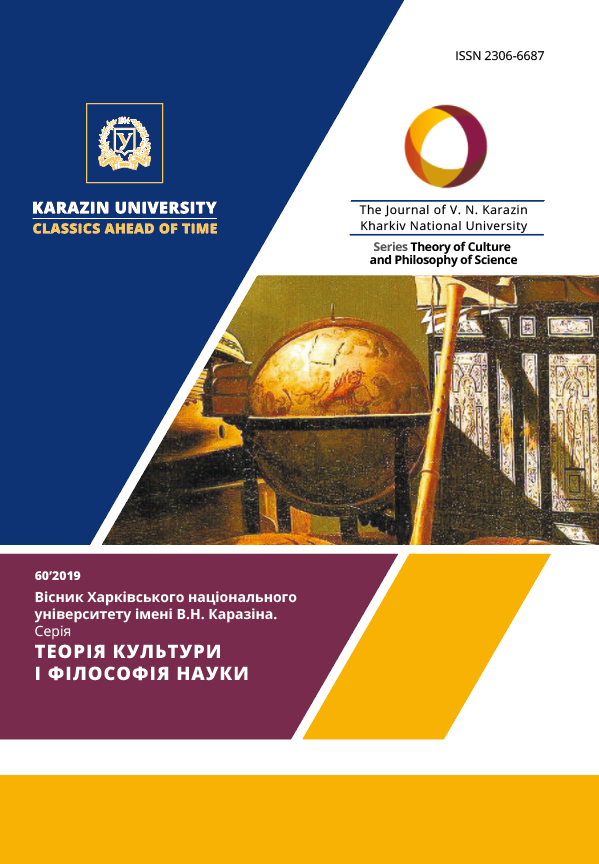DOCUMENTARY AS A PHANTOM
GAMES OF DEFINITIONS
Abstract
The aim of the study is to reflect on the problem of the “documentariness” of documentary films based on the refinement of the semantic spectrum of the “documentary” concept. The definitions spectrum of the “documentary” concept in classical and post-non-classical film studies from B. Matushevsky, J. Grierson and D. Vertov to R. M. Barsam, J. Gaines, P. Lorentz, R. D. McKenn, B. Nichols, M. Renov, L. Ward (and others) is analyzed. As a generalization of these definitions, the author’s definition of “documentary” is proposed: the term “documentary” refers to a film not as an affirmative form of a completed film statement, but as an interrogative form of an open film gesture balancing on the verge of “truth” and “fiction”, as the continuity of an implicit mutual transition between non-fiction and fiction methods of cinema narration, a kind of hybrid between the video fixation of authentic facts with documentary value and their cinematic interpretation, which involves a reconfiguration of the reality caused by the “observer effect,” an interpretation of documented facts, and a creative implication of the ideas of the authors of the film. are a kind of hybrid between cinema recording of authentic facts of documentary value and cinematic interpretation of them, which involves reconfiguration of reality caused by the “observer effect”, author's interpretation of documented facts and creative implication of the ideas of movie makers. “Hybrid” genres combining the features of documentary and features of non-fiction film are described: “docudrama”, “mockumentary”, and the “art-dock”. The problem of the “documentariness” of documentary is considered with the help of a number of film cases from L. Riefenstahl, P. Watkins and R. Carmen to V. Mansky, S. Loznitsa and I. Khrzhanovsky. The main conclusion to the study is the assertion that there is sufficient reason to consider “documentary” a very abstracted “empty signifier” – a concept with a “blurred semantic field” and a “weak ontological status”. In general, the “documentariness” of documentary is as much desired as the shaky movie illusion: there are documentary shotings and documentary shots as the primary material of the film, but the “documentary” film as such does not exist, or it is a phantom.
Downloads
References
Кан О. Проект «Дау»: новий рівень взаємодії мистецтва і реальності. BBC News Україна. URL: https://www.bbc.com/ukrainian/features-47006238
Aufderheide P. Documentary Film: A Very Short Introduction. New York, NY: Oxford University Press, 2008. 176 p.
Barsam R. M. Nonfiction Film – A Critical History. Rev., expanded ed. New York, NY: John Wiley & Sons, 1992. 160 p.
Bernard Sh. C. Documentary Storytelling: Creative Nonfiction on Screen. 4rd ed. London, UK; New York, NY: Routledge, 2016. 378 p.
Block B. The Visual Story: Creating the Visual Structure of Film, TV and Digital Media. 2nd ed. London, UK; New York, NY: Routledge, 2007. 310 p.
Bruzzi S. New Documentary. 2nd ed. London, UK; New York, NY: Routledge, 2006. 224 p.
Cheshire E. Leni Riefenstahl: Documentary Film-Maker or Propagandist? 2019. URL: https://www.ellencheshire.com/post/2019/05/21/leni-riefenstahl-documentary-filmmaker-or-propagandist
Contemporary Documentary / D. Marcus, S. Kara. London (eds.). London, UK; New York, NY: Routledge, 2015. 228 p.
Curthoys А. Connected worlds: history in transnational perspective. Canberra, Australia: ANU Press, 2010. 290 р.
Gaines J., Renov M. Collecting Visible Evidence. Minneapolis, MN: University of Minnesota Press, 1999. 352 p.
History/Film. Archived from the original on 26 March 2018. Retrieved 25 April 2018. URL: www.mcc.murdoch.edu.au
Leach J. Documenting the Documentary: Close Readings of Documentary Film and Video / K. K. Grant (ed.) et al. Detroit: Wayne State University Press, 1998. 488 p.
Lorentz P. Film Library – FDR and Film. 24 July 2011. Archived from the original on 24 July 2011. Retrieved 25 April 2018. URL: https://www.fdrlibrary.org/pare-lorentz-film-center
MacDonald K., Cousins M. Imagining Reality. Bloomsbury, London: Faber & Faber, 2005. 496 p.
MacKenzie S. Film Manifestos and Global Cinema Cultures: A Critical Anthology. Oakland, CA: University of California Press, 2014. 676 p.
Nichols B. Introduction to Documentary. 3rd ed. Bloomington: Indiana University Press, 2013. 268 p.
Nichols B. Speaking Truths with Film – Evidence, Ethics, Politics in Documentary. Berkeley: University of California Press, 2016. 272 p.
Rabiger M. Directing the Documentary. 6th ed. London; New York: Routledge, 2014. 572 p.
Renov M. Theorizing Documentary (AFI Film Readers). London; New York: Routledge, 1993. 272 p.
Spence L., Navarro V. Crafting Truth: Documentary Form and Meaning. New Brunswick: Rutgers University Press, 2011. 272 p.
The Documentary Film Reader: History, Theory, Criticism / foreword by Charles Musser. New York: Oxford University Press, 2016. 1056 p.
Todd B., McConnell D. Propaganda film project backfires on North Korea. CNN. URL: https://edition.cnn.com/2016/06/22/asia/north-korea-propaganda/index.html
Ward L. Introduction: Lecture Notes for the BA in Radio-TV-Film (RTVF). 375: Documentary Film & Television.
California State University, Fullerton (College of communications): 4, slide 12. Archived from the original (PDF) on 2006-09-03/. URL: http://www.fullerton.edu/catalog/archive/2007_2009/Catalog_pdf/pdf/454-509_ratvflm-wmst.pdf
Wells J. How to Film Truth: The Story of Documentary Film as a Spiritual Journey. Eugene, Oregon: Cascade Books, 2018. 79 р. (Reel Spirituality Monograph Series Book).




